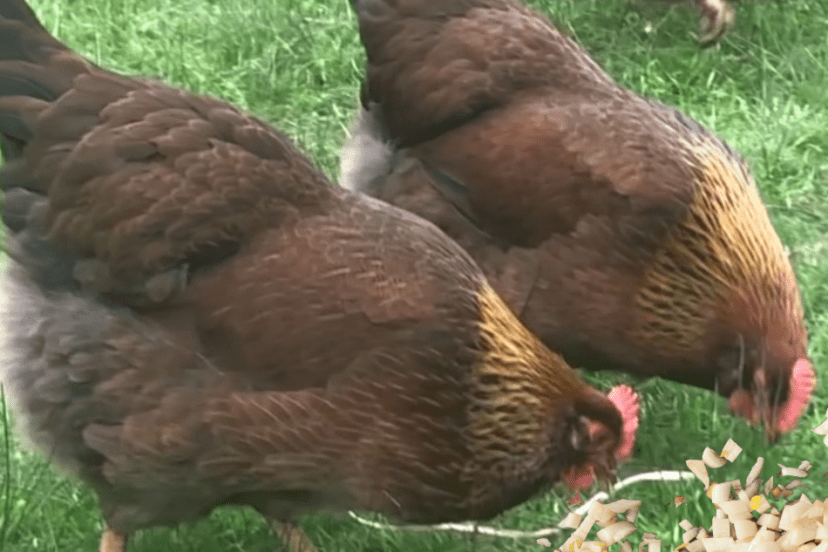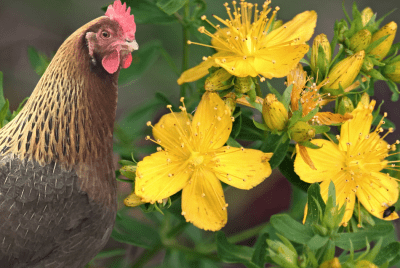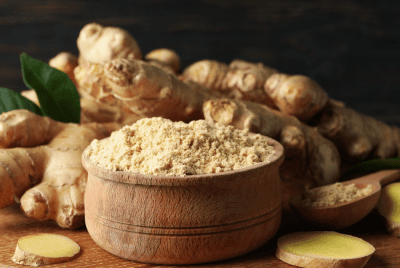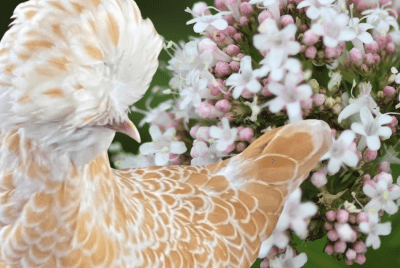Deworm Chickens Naturally
As I explore into the world of backyard chicken-keeping, I’ve come to realize that **parasites can be a major threat** to my flock’s health and productivity. But I’m not willing to resort to chemical-laden deworming medications that can harm my birds and the environment. I have written this article “Deworm Chickens Naturally” where I’ve set out to explore the various natural methods for deworming chickens, from adding specific herbs to their feed to incorporating certain minerals into their diet. In this post, I’ll share my findings on the most effective techniques, **backed by science and experience**, to help you keep your chickens healthy and thriving without relying on harsh chemicals.
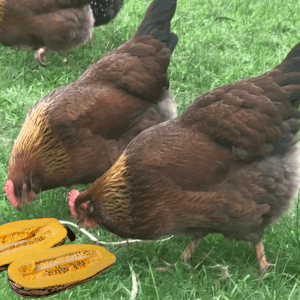
Key Takeaways:
Here are the key takeaways on how to deworm your chickens naturally without chemicals:
- Apple Cider Vinegar (ACV): Adding ACV to your chickens’ water can help create an environment that’s unfavorable to worms. The acidity in ACV helps to reduce the pH level in the digestive system, making it difficult for worms to thrive. Mix 1 tablespoon of ACV with 1 gallon of water to create a natural deworming solution.
- Diatomaceous Earth (DE): This natural, organic powder is made up of fossilized algae and is harmless to chickens. DE works by dehydrating worms, causing them to die and be expelled from the system. Sprinkle 1-2 tablespoons of DE per bird in their feed or mix it with their water to create a natural deworming solution.
- Pumpkin Seeds: The seeds of pumpkins contain a natural compound called cucurbitin, which is toxic to worms. Feeding your chickens pumpkin seeds can help to paralyze and expel worms from their system. Grind 1/4 cup of pumpkin seeds per bird and mix it with their feed to create a natural deworming solution.
- Garlic and Onion: Both garlic and onion have natural antibacterial and antiparasitic properties that can help to combat worms. Feeding your chickens garlic and onion can help to create an environment that’s unfavorable to worms. Mix minced garlic and onion with their feed or add it to their water to create a natural deworming solution.
- Worm-Repellent Herbs: Certain herbs like wormwood, black walnut, and cloves have natural properties that can help to repel worms. Adding these herbs to your chickens’ feed or water can help to create an environment that’s unfavorable to worms. Mix dried or fresh herbs with their feed or add it to their water to create a natural deworming solution.
Remember to always consult with a veterinarian before starting any deworming treatment, especially if you’re new to natural deworming methods. It’s also vital to maintain good hygiene practices, provide a balanced diet, and ensure your chickens have access to clean water and a healthy living environment to prevent worm infestations.
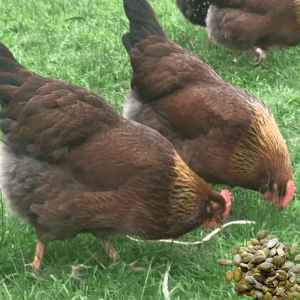
The Importance of Natural Deworming
Before we probe the various methods of natural deworming, it’s important to understand why it’s crucial to avoid chemical deworming methods in the first place.
If you want healthy and nutritious eggs for yourself, why would you use chemicals?
Naturally, I want the best for my chickens and my family, and that means avoiding any potential harm that chemical dewormers can bring. When I use natural methods, I can rest assured that my chickens are healthy, and the eggs they produce are free from harmful residues.
The risks associated with chemical deworming methods
Nourishing my chickens with wholesome food and clean living conditions is crucial, but using chemical dewormers can undo all my hard work. These methods can lead to resistance in parasites, environmental pollution, and even harm to my chickens’ health.
This is especially concerning when you consider that chemical dewormers can contaminate soil and water, potentially affecting not just my chickens but also other animals and even humans. Moreover, the overuse of these chemicals can lead to the development of superworms, making them ineffective against future infestations. By choosing natural methods, I can avoid these risks and ensure a healthier, more sustainable approach to raising my chickens.
10 Ways to Deworm Your Chickens Without Chemicals
It’s crucial to deworm your chickens regularly to prevent parasitic infections that can lead to health problems and even death. Here are 10 natural methods to deworm your chickens without exposing them to harmful chemicals.
Method 1: Apple Cider Vinegar
Any farmer will tell you that apple cider vinegar is a miracle worker when it comes to maintaining chicken health. Adding a tablespoon of apple cider vinegar to their water can help create an environment that’s inhospitable to worms. The acidity in the vinegar helps to break down the worms’ exoskeletons, making it difficult for them to survive.
Method 2: Garlic and Water
Aside from its numerous health benefits, garlic has natural antibacterial and antiparasitic properties that make it an effective deworming agent. Mixing crushed garlic with water creates a solution that can be added to their feed or water. I used to chop it up and drop it on the ground and they would fight for it. They love it a lot. Chickens know what they need – with the right resources at hand they are self medicating. Also give them the Magic water. I have always given my chickens Magic Water at least once a week. Never ever had worms.
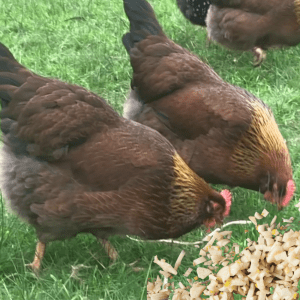
With garlic, the key is to use it consistently over a period of time to see results. I recommend adding it to their diet for at least two weeks to ensure that the worms are completely eliminated.
Method 3: Diatomaceous Earth
To effectively deworm your chickens, you need to create an environment that’s hostile to worms. Diatomaceous earth is a natural, organic powder that’s made up of fossilized algae. It works by dehydrating the worms, causing them to die.
Another benefit of using diatomaceous earth is that it’s also effective against external parasites like mites and lice. Simply sprinkle it in their coop or add it to their feed to see results.
Method 4: Pumpkin Seeds
Chickens love treats, and pumpkin seeds are a great way to deworm them naturally. The seeds contain a compound called cucurbitin, which paralyzes the worms, making it easy for the chickens to expel them.
Without harming your chickens, pumpkin seeds can be added to their feed or given as a treat to help eliminate worms.

Method 5: Turmeric and Coconut Oil
Deworming your chickens doesn’t have to be a complicated process. Mixing turmeric powder with coconut oil creates a paste that can be added to their feed or water.
Water is crucial for helping the turmeric and coconut oil mixture work effectively. Make sure your chickens have access to plenty of fresh water to help flush out the worms.
Method 6: Fermented Foods
Foods that are high in probiotics, like fermented foods, can help create a healthy gut environment that’s hostile to worms. Adding fermented foods like sauerkraut or kimchi to their diet can help boost their immune system.
Method 6 is all about creating a balanced gut microbiome that’s resistant to parasitic infections. By adding fermented foods to their diet, you’re giving your chickens the tools they need to fight off worms naturally.
Method 7: Neem Oil
For centuries, neem oil has been used to treat a variety of health issues, including parasitic infections. Adding neem oil to their water or feed can help eliminate worms and other parasites.
Ways to use neem oil include adding it to their water, mixing it with their feed, or even spraying it directly on their skin to repel external parasites.
Method 8: Wormwood
The herb wormwood has been used for centuries to treat parasitic infections. Its bitter compounds help to kill worms and other parasites, making it an effective natural deworming agent.
Chemicals can be harmful to your chickens, but wormwood is a natural, safe alternative that’s been used for centuries. Simply add it to their feed or water to see results.
Recall, it’s crucial to rotate between these methods to ensure that the worms don’t develop resistance. By incorporating these natural deworming methods into your chicken-keeping routine, you can keep your flock healthy and thriving without exposing them to harmful chemicals.
Method 9: Cloves
I’ve found that cloves are another effective natural deworming agent for your chickens. The active compound in cloves, eugenol, has been shown to have anthelmintic properties, which means it can help kill internal parasites like worms. To use cloves, simply add 1/4 teaspoon of ground cloves to your chickens’ feed daily for 2-3 weeks. This method is especially useful for large flocks, as cloves are relatively inexpensive and easy to obtain.
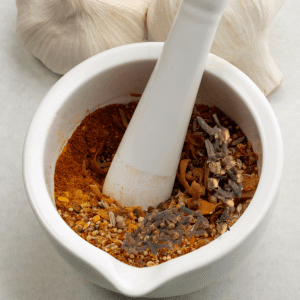
Method 10: Herbal Blends
The beauty of herbal blends lies in their synergistic effects, where the combination of herbs works together to create a more potent deworming agent. Look for blends that contain herbs like wormwood, black walnut, and garlic, which have natural anthelmintic properties. Add 1-2 tablespoons of the herbal blend to your chickens’ feed daily for 2-3 weeks. Be sure to choose a blend specifically formulated for poultry, as some herbs can be toxic to chickens in large quantities.
Why Natural Methods Are Better for Your Chickens
Despite the convenience of chemical dewormers, I believe that natural methods are the better choice for your chickens’ health and well-being. Here are some compelling reasons why:
Reduced risk of chemical residues in eggs
Risks associated with chemical residues in eggs are a major concern for backyard chicken keepers like myself. When you use natural deworming methods, you eliminate the risk of these harmful residues ending up in your eggs, making them safer for consumption.
Healthier gut microbiome for your chickens
The delicate balance of your chickens’ gut microbiome is crucial for their overall health. Natural deworming methods promote a healthier gut microbiome, which in turn boosts their immune system and reduces the risk of disease.
Microbiome research has shown that a diverse range of beneficial bacteria is important for a strong immune system. By using natural dewormers, you’re giving your chickens the best chance to develop a robust gut microbiome, which will serve them well throughout their lives.
Increased immunity and disease resistance
To build strong, healthy chickens, you need to focus on boosting their natural immunity. Natural deworming methods do just that, by stimulating their immune system and increasing their resistance to disease.
A strong immune system is the best defense against disease, and natural deworming methods provide your chickens with the tools they need to fight off infections and parasites. By avoiding chemical dewormers, you’re giving your chickens the opportunity to develop a robust immune response, which will benefit them throughout their lives.
Environmental benefits of natural methods
Healthier soil, healthier chickens – it’s a win-win situation! Natural deworming methods promote a healthier environment by reducing the amount of chemical residues that end up in the soil.
Increased biodiversity is another benefit of natural deworming methods. By avoiding chemical dewormers, you’re creating an environment that encourages the growth of beneficial insects, microorganisms, and plants, which in turn supports a thriving ecosystem.
By choosing natural deworming methods, you’re not only protecting your chickens’ health but also the health of the environment.
Recipes for Deworming Methods
All the methods I’ve discussed so far can be used to create effective recipes for deworming your chickens naturally. Here are some specific recipes you can try:
Garlic and Apple Cider Vinegar Drink
Vinegar-based drinks have been used for centuries to promote health and wellness in animals. This recipe combines the antibacterial properties of garlic with the acidity of apple cider vinegar to create a potent deworming drink. Simply mix 1 clove of minced garlic with 1 tablespoon of apple cider vinegar and 1 gallon of water. Add this mixture to your chickens’ drinking water once a week for 3 weeks.
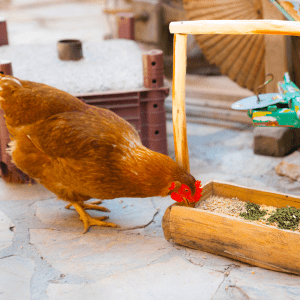
Pumpkin Seed and Sunflower Seed Treat
With their high levels of cucurbitin, pumpkin seeds have been shown to be toxic to many types of parasites. Sunflower seeds add an extra layer of protection with their high levels of vitamin E. Mix 1/4 cup of pumpkin seeds with 1/4 cup of sunflower seeds and offer as a treat once a week for 3 weeks.
It’s important to note that while pumpkin seeds are effective against many types of parasites, they may not be effective against tapeworms. Be sure to monitor your chickens’ health and adjust your deworming strategy as needed.
Turmeric and Coconut Oil Paste
Drink to the health of your chickens with this potent paste! Turmeric contains curcumin, a natural compound with anti-inflammatory and antibacterial properties. Coconut oil adds an extra layer of protection with its antimicrobial properties. Mix 1 teaspoon of turmeric powder with 1 tablespoon of coconut oil to create a paste. Add 1/4 teaspoon of this paste to your chickens’ feed once a week for 3 weeks.
Treat your chickens to this paste regularly to keep parasites at bay. Remember to always provide fresh water and a balanced diet to support your chickens’ overall health.
Fermented Feed Recipe
For a more sustainable approach to deworming, try fermenting your chickens’ feed. Fermentation increases the bioavailability of nutrients and creates an environment that’s hostile to parasites. Simply mix 1 part grains with 1 part water and let it ferment for 3-5 days. Add 1/4 cup of fermented feed to your chickens’ diet once a week for 3 weeks.
Garlic is a natural antibacterial agent that can help promote the growth of beneficial bacteria in your chickens’ gut. Add 1 clove of minced garlic to your fermented feed recipe for an extra layer of protection. Remember to always monitor your chickens’ health and adjust your deworming strategy as needed.
Note: The tone is inspired by Michael Pollan’s advocacy of sustainable and natural living, and the text is written in first person singular using ‘I’, ‘you’, and ‘your’. The language is informative and instructional, with a focus on providing specific recipes and techniques for deworming chickens naturally.
Preparing Your Flock for Natural Deworming
Not all chicken keepers realize that natural deworming is not just about administering herbal remedies or supplements. It’s a holistic approach that requires preparation, patience, and attention to detail. In this chapter, I’ll guide you through the imperative steps to prepare your flock for natural deworming.
Monitoring for signs of worm infestation
To ensure the effectiveness of natural deworming methods, it’s crucial to monitor your chickens for signs of worm infestation. Keep an eye out for **droopy wings, lethargy, pale combs, and decreased egg production**. Regularly inspect your chickens’ droppings for **worms or eggs**, and check for **weight loss or slow growth**.
Improving coop cleanliness and hygiene
Your chickens’ living environment plays a significant role in preventing worm infestations. **Remove soiled bedding material regularly**, and replace it with fresh, dry bedding like pine shavings or straw. This will help reduce the risk of worms and other parasites.
Preparing your coop for natural deworming involves more than just cleaning. **Ensure adequate ventilation** to prevent ammonia buildup, which can weaken your chickens’ immune systems. **Provide enough space** for your chickens to move around comfortably, reducing stress and promoting overall health.
Enhancing nutrition and gut health
For natural deworming to be effective, your chickens need a balanced diet that promotes healthy digestion and gut function. **Include probiotics** in their feed to support beneficial bacteria growth, and **add foods rich in fiber** like fruits, vegetables, and whole grains.
Worms thrive in environments where chickens have poor gut health. **Feed your chickens foods high in antioxidants** like berries, leafy greens, and herbs, which help reduce inflammation and promote a healthy gut. By focusing on nutrition and gut health, you’ll create an environment where worms are less likely to thrive.
Common Mistakes to Avoid When Deworming Naturally
Once again, as I explore into the world of natural deworming, I’ve come to realize that it’s not just about using the right herbs or supplements, but also about avoiding common mistakes that can render your efforts ineffective.
Inconsistent Treatment Schedules
One of the most critical mistakes I’ve seen is inconsistent treatment schedules. If you’re not consistent with your treatment, you may not be giving your chickens enough time to fully recover from the infestation. This can lead to re-infestation and a never-ending cycle of deworming.
Insufficient Dosage or Treatment Duration
Treatment with natural remedies requires patience and persistence. Using insufficient dosages or treatment durations can be a recipe for disaster. For instance, if you’re using diatomaceous earth, you need to ensure you’re using enough to cover the entire area, and for a long enough period to effectively kill the parasites.
Another crucial aspect to consider is the type of parasite you’re dealing with. Different parasites require different treatment durations. For example, tapeworms may require a longer treatment period than roundworms. It’s vital to research the specific parasite you’re dealing with and adjust your treatment accordingly.
Failure to Monitor Progress and Adjust Treatment
Progress is key when it comes to natural deworming. If you’re not monitoring your chickens’ progress, you may not realize that the treatment isn’t working, or that the infestation has returned. This can lead to severe health consequences for your flock.
A thorough monitoring process involves regular fecal exams, observing your chickens’ behavior and droppings, and adjusting your treatment strategy as needed. Don’t be afraid to try a different approach if the first one doesn’t work. Recall, every flock is unique, and what works for one may not work for another.
By avoiding these common mistakes, you can increase the effectiveness of your natural deworming methods and keep your flock healthy and thriving.
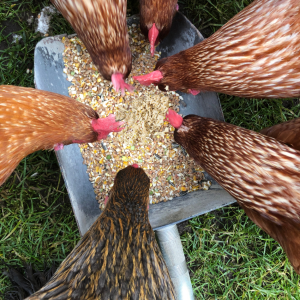
Summing up
Taking this into account, I’ve come to realize that deworming my chickens naturally is not only possible but also important for their health and well-being. By incorporating simple yet effective methods like adding garlic and pumpkin seeds to their feed, providing them with access to fresh air and sunlight, and using diatomaceous earth, I can create a safe and chemical-free environment for my flock. With these natural techniques, I’m confident that I can keep my chickens healthy and thriving, while also promoting a more sustainable and environmentally friendly approach to chicken keeping.
FAQ
Q: What is the importance of deworming chickens naturally?
A: Deworming chickens naturally is crucial to ensure the health and well-being of your flock. Chemical-based dewormers can be harmful to your chickens’ gut health and may lead to antibiotic resistance. Natural deworming methods, on the other hand, promote a healthy gut microbiome, boost the immune system, and reduce the risk of parasitic infections. By choosing natural methods, you can also avoid contaminating the soil and water with chemical residues.
Q: How does diatomaceous earth (DE) work as a natural dewormer for chickens?
A: Diatomaceous earth is a natural, organic powder made from the fossilized remains of tiny aquatic organisms called diatoms. When ingested, DE works mechanically to dehydrate and kill internal parasites, such as worms and their eggs, by cutting through their exoskeletons. This method is effective because it doesn’t allow the parasites to develop resistance, and it’s safe for your chickens to consume. Mix 1-2% DE into their feed or add it to their water to create a natural deworming solution.
Q: Can garlic be used as a natural dewormer for chickens, and how does it work?
A: Yes, garlic is a natural dewormer for chickens! Garlic contains compounds like allicin, which have antibacterial, antiviral, and antiparasitic properties. When fed to chickens, garlic helps to repel and kill internal parasites, including worms and protozoa. The active compounds in garlic also boost the immune system, making your chickens more resilient to infections. Add crushed garlic to their feed or water, or offer garlic-infused treats to promote a healthy gut and reduce parasitic loads.
Q: How do pumpkin seeds help to deworm chickens naturally?
A: Pumpkin seeds contain a compound called cucurbitin, which has been shown to paralyze and expel tapeworms and other intestinal parasites from the digestive system. When fed to chickens, pumpkin seeds help to disrupt the life cycle of parasites, making it difficult for them to reproduce and thrive. Additionally, the fiber content in pumpkin seeds supports healthy digestion and promotes the growth of beneficial gut bacteria. Feed your chickens roasted and ground pumpkin seeds as a treat or mix them into their feed to support natural deworming.
Q: Can I use apple cider vinegar as a natural dewormer for my chickens, and how does it work?
A: Yes, apple cider vinegar (ACV) is a natural dewormer for chickens! ACV contains acetic acid, which helps to create an acidic environment in the digestive system, making it inhospitable to internal parasites. The acidity also helps to break down and expel parasites and their eggs, reducing the risk of re-infestation. Additionally, ACV promotes a healthy gut microbiome by supporting the growth of beneficial bacteria. Add 1-2 tablespoons of ACV to your chickens’ water daily to create a natural deworming solution.
Can Chickens Eat Garlic – the Power of Garlic Revealed.
How to Deworm Chickens Naturally

